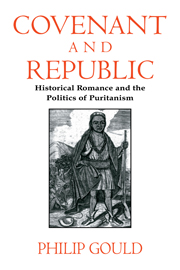Book contents
- Frontmatter
- Contents
- Acknowledgments
- Introduction: The Historicity of Historical Fiction
- 1 The New Ebenezer: Republican Virtue, the Puritan Fathers, and Early National History-Writing
- 2 Catharine Sedgwick's “Recital” of the Pequot War
- 3 Refashioning the Republic: Gender, Ideology, and the Politics of Virtue in Hobomok and Hope Leslie
- 4 The “Hive of America”: James Fenimore Cooper's The Wept of Wish-ton-Wish and the History of King Philip's War
- 5 Witch-Hunting and the Politics of Reason
- Afterword: American Origins of Puritan Selves
- Notes
- Index
- Titles in the series
Introduction: The Historicity of Historical Fiction
Published online by Cambridge University Press: 23 November 2009
- Frontmatter
- Contents
- Acknowledgments
- Introduction: The Historicity of Historical Fiction
- 1 The New Ebenezer: Republican Virtue, the Puritan Fathers, and Early National History-Writing
- 2 Catharine Sedgwick's “Recital” of the Pequot War
- 3 Refashioning the Republic: Gender, Ideology, and the Politics of Virtue in Hobomok and Hope Leslie
- 4 The “Hive of America”: James Fenimore Cooper's The Wept of Wish-ton-Wish and the History of King Philip's War
- 5 Witch-Hunting and the Politics of Reason
- Afterword: American Origins of Puritan Selves
- Notes
- Index
- Titles in the series
Summary
One of the early American republic's most hostile critics of the Salem witchcraft trials, Charles Wentworth Upham, concluded his Lectures on Witchcraft (1831) with some rather pointed remarks about his own era. Upham, a Unitarian minister, argued that the episode held particular meaning for contemporary New Englanders. As if his immediate audience might be too obtuse to interpret the lesson of Salem correctly, Upham instructed them in no uncertain terms to read the hysteria of 1692 as a political trope for an immediate problem. “[W]henever a community,” he warned, “gives way to its passions … and casts off the restraints of reason, there is a delusion that can hardly be described in any other phrase. We cannot glance our eye over the face of our country, without beholding such scenes…. It would be wiser to direct our ridicule and reproaches to the delusions of our own times, rather than to those of a previous age, and it becomes us to treat with charity and mercy the failings of our predecessors, at least until we have ceased to imitate and repeat them.” One is struck immediately by the sense of urgency with which Upham displaces colonial history with a contemporary crisis, one where the people's civic behavior is contingent upon the faculty of reason. (In fact, in Chapter 5 I take up the politics of faculty psychology surrounding the period's historical literature about the Salem witchcraft trials.) Chastising his readers to get out of the seventeenth century, Upham rather abruptly reorients them to nineteenth-century politics, as though their obsession with their ancestors' foibles has dulled their capacity for self-examination.
- Type
- Chapter
- Information
- Covenant and RepublicHistorical Romance and the Politics of Puritanism, pp. 1 - 19Publisher: Cambridge University PressPrint publication year: 1996



